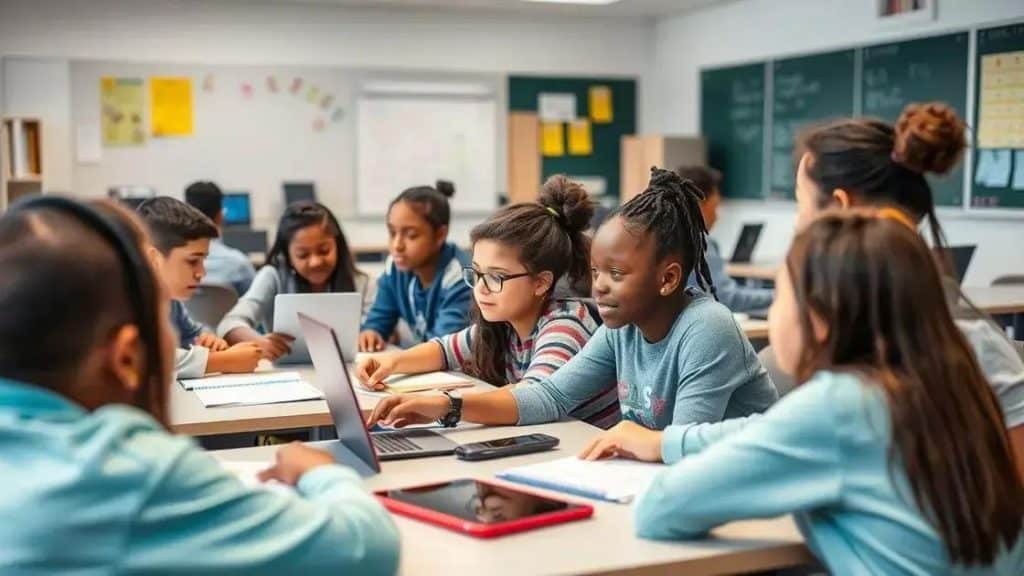Current patterns in academic success: 2025 forecast

Current patterns in academic success for 2025 highlight the critical role of mental health, technological advancements, and essential skills development in shaping future education and job market readiness.
Current patterns in academic success suggest that the landscape of education is rapidly evolving. With new technologies and shifting job requirements, understanding these changes can help students and educators navigate the future effectively.
Defining academic success in 2025
Defining academic success in 2025 requires a fresh perspective on what achievement means in an ever-changing educational landscape. As we move forward, traditional metrics may no longer capture the full essence of a student’s capabilities and future potential.
Redefining Success Metrics
In the coming years, academic success will encompass more than just grades. It will include skills like critical thinking, creativity, and emotional intelligence. Schools will need to adapt their evaluation methods to reflect these new metrics.
- Emphasis on problem-solving skills.
- Encouragement of teamwork and collaboration.
- Focus on adaptability in various contexts.
The Role of Technology
Technology will play a key role in shaping academic success. Digital tools can enhance learning experiences and provide students with personalized education paths. This shift allows for greater engagement and supports diverse learning styles.
Moreover, students will need to become proficient in using technology effectively. Skills like digital literacy and online research will be essential for future academic and professional success.
Holistic Development
It’s increasingly important for schools to support the holistic development of students. This includes mental health and well-being, which are crucial for academic performance. Programs aimed at building resilience and coping strategies will become a priority.
- Implementing mental health resources in schools.
- Encouraging sports and extracurricular activities.
- Teaching mindfulness and stress management techniques.
As we define academic success in 2025, it’s vital to consider the whole student. Balancing academic excellence with emotional and social growth will create well-rounded individuals prepared for the challenges ahead.
Key factors influencing academic achievement
Understanding the key factors influencing academic achievement is essential as we look towards the future of education. Various elements play a crucial role in shaping student performance and overall success.
Environment and Support Systems
A positive learning environment greatly affects student outcomes. Support from family, teachers, and peers can motivate students and foster a love for learning. To encourage success, schools need to create safe spaces where students feel valued and engaged.
- Access to resources like libraries and technology.
- Positive relationships with teachers and mentors.
- A supportive home environment encourages learning.
Individual Characteristics
Students’ individual characteristics, such as learning styles and motivation levels, also impact their academic success. Recognizing these traits allows educators to tailor their teaching methods to meet diverse student needs. Factors such as resilience and self-discipline are essential for overcoming challenges.
For instance, motivated students often seek additional resources, ask questions, and engage more deeply in their subjects. This proactive approach can enhance understanding and mastery.
Technological Integration
Furthermore, the integration of technology in the classroom is transforming learning dynamics. When used effectively, technology can provide unique opportunities for student engagement and personalized learning.
- Online resources support independent study.
- Interactive tools make learning more engaging.
- Technology enables collaboration among students.
By understanding these key factors influencing academic achievement, educators can create strategies that better support their students. Tailoring approaches to the needs of each student can lead to more significant successes, as the educational landscape continues to evolve.
Technological impact on learning processes

The technological impact on learning processes is profound and ongoing. As we progress into the future, technology continues to reshape how students learn and interact with information.
Enhanced Learning Tools
One significant change has been the introduction of interactive tools and resources. These resources can enhance engagement and make learning more enjoyable. For instance, virtual reality (VR) and augmented reality (AR) provide immersive experiences that traditional methods simply cannot offer.
- VR allows simulations of real-world scenarios.
- AR overlays digital information on physical environments.
- Interactive apps and games increase student involvement.
Personalized Learning Experiences
Technology also enables personalized learning experiences. Adaptive learning platforms can assess individual students’ strengths and weaknesses, offering tailored content that best suits their needs. This approach empowers students to take ownership of their education and progress at their own pace.
Additionally, mobile devices allow students access to learning materials anytime, anywhere. This flexibility supports diverse learning styles and fosters a more inclusive environment.
Collaboration and Communication
Moreover, technology has transformed how students collaborate and communicate. Online platforms facilitate teamwork and discussions beyond the classroom, connecting students across different regions.
- Cloud-based tools support group projects.
- Discussion forums encourage idea exchange.
- Video conferencing tools enable virtual meetings.
In conclusion, the technological impact on learning processes not only enhances the educational experience but also prepares students for a rapidly evolving world. By embracing these advancements, educators can create a more effective and engaging learning environment.
Importance of mental health in education
The importance of mental health in education cannot be overstated. Students today face many pressures, from academic demands to social challenges, making emotional well-being a crucial aspect of their success.
Impact on Learning
Mental health significantly influences learning outcomes. When students are mentally healthy, they are more focused and engaged in their studies. Conversely, those struggling with mental health issues may experience difficulties in concentration and motivation, hindering their academic performance.
- Positive mental health leads to improved focus and retention.
- Students with mental health challenges may experience lower grades.
- A supportive environment fosters better learning experiences.
Social Interaction and Relationships
Moreover, mental health affects how students interact with peers and teachers. Healthy students are more likely to form positive relationships, which enhances their school experience. In contrast, students facing mental health issues may isolate themselves or struggle with social skills.
Creating a school environment that encourages healthy relationships can help students feel safe and connected. Regular mental health awareness programs can educate students about the importance of emotional well-being.
Support Systems
Establishing strong support systems is vital. Schools should provide access to mental health resources, such as counselors and support groups. Students should feel comfortable seeking help without stigma.
- Access to onsite counselors helps address issues early.
- Peer support programs encourage open discussions about well-being.
- Workshops on stress management teach valuable coping skills.
Ultimately, prioritizing mental health in education contributes to a more supportive and productive learning environment, laying the foundation for successful futures.
Future job market and skills needed
Understanding the future job market and skills needed is essential for students preparing to enter the workforce. As technology continues to evolve, the competencies required have shifted dramatically.
Emerging Industries
New industries are developing, driven by advancements in technology and changes in consumer behavior. Fields like artificial intelligence, renewable energy, and biotechnology are expected to grow significantly. As a result, students should consider career paths in these areas.
- Artificial intelligence and machine learning.
- Renewable energy and sustainability.
- Healthcare technology and telehealth services.
Essential Skills
Beyond specific industries, certain skills will be crucial across various sectors. Employers are increasingly looking for candidates who possess a mix of technical and soft skills.
Key skills for the future include critical thinking, problem-solving, and creativity. Additionally, strong communication and teamwork abilities are vital in collaborative work environments.
- Critical thinking and decision-making.
- Effective communication and interpersonal skills.
- Adaptability and flexibility in changing situations.
Technical Proficiency
Students must also be tech-savvy, as nearly every job will involve some level of digital competence. Familiarity with data analysis, programming, and basic software applications will be valuable. Understanding how to navigate digital tools enhances employability in the modern job market.
As industries continue to evolve, lifelong learning and continuous skill development will become increasingly important. Engaging in ongoing education and training will equip students with the tools they need to adapt to changing demands.
FAQ – Frequently Asked Questions about Academic Success and Future Skills
What factors influence academic success?
Key factors include mental health, technological integration, and supportive learning environments that foster student engagement.
How does technology affect learning?
Technology enhances learning by providing interactive tools and resources that engage students and support various learning styles.
What skills will be important for future jobs?
Essential skills include critical thinking, creativity, communication, and adaptability, alongside technical proficiency in digital tools.
Why is mental health important in education?
Mental health supports students’ emotional well-being, helping them focus better, build relationships, and achieve their academic goals.





